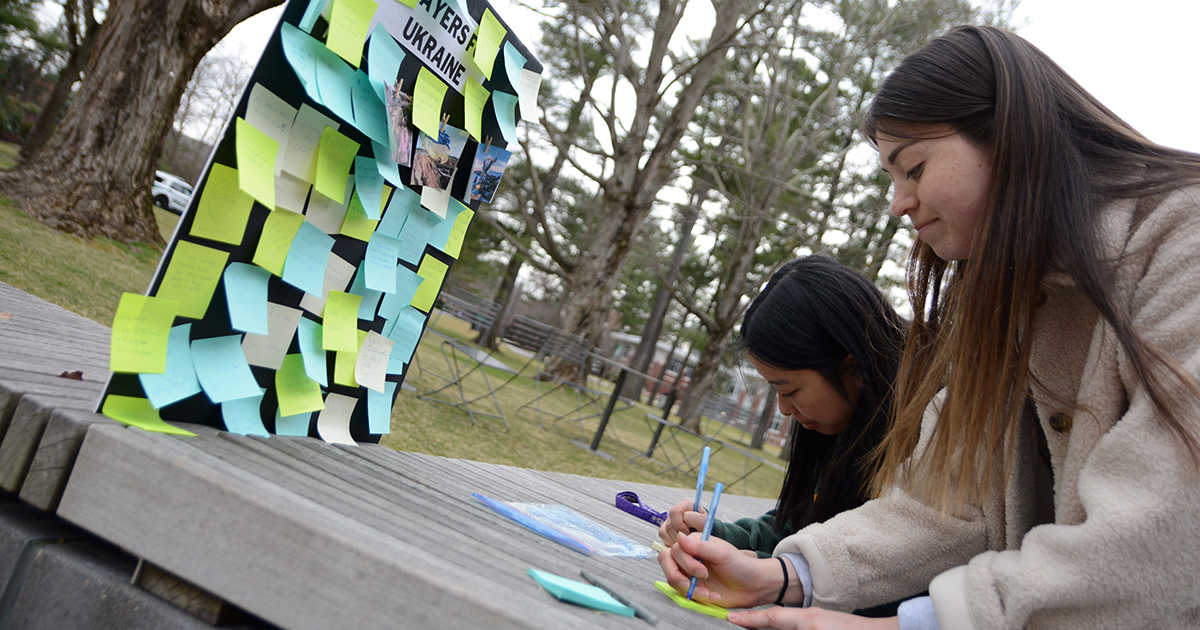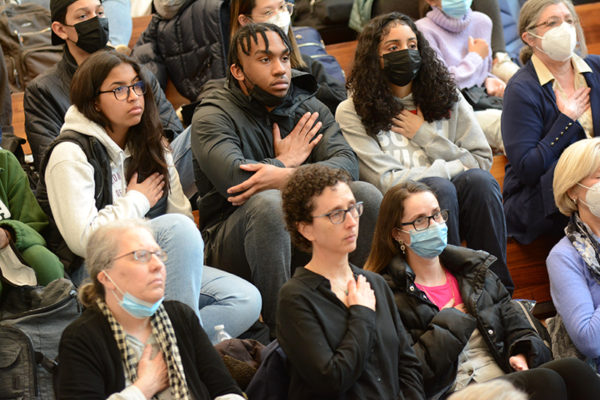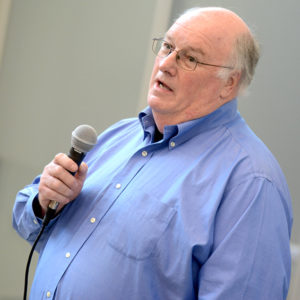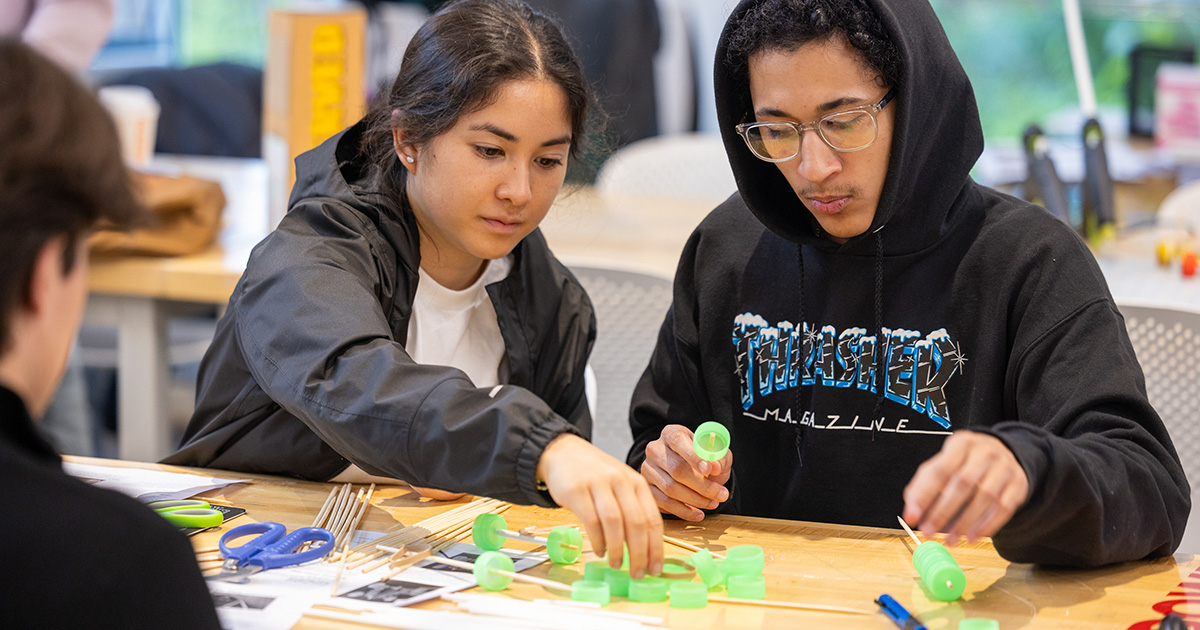A Teaching Moment: The Impact of the Invasion of Ukraine

For Bill Coyle, it’s personal.
Russia’s invasion of Ukraine—and the devastating impact on the people and countries he loves—is so heartbreaking for him that he chokes up when he talks about it. “It’s so sad, and it’s so unnecessary,” the Babson College associate professor of accounting said.
As director of Babson’s Russian programs, Coyle has taken dozens of groups of MBA and undergraduate students to Russia in the last 29 years. In 1994, Coyle personally signed the document creating the first agreement between Babson and St. Petersburg University. That document, which sits in the College archives, also was signed by then-vice mayor for international relations for the city of St. Petersburg: Vladimir Putin.
Coyle also was married in Kharkiv, Ukraine, and he has countless friends and acquaintances—both in Ukraine and Russia—that he worries about constantly. “I’ve lost touch with folks in Kharkiv because there’s no communication. The infrastructure is just gone,” he said. “So, I hope they’re still alive. I don’t know.”
Coyle shared his heartfelt and personal connections and his expertise last week at a Ukraine-Russia teach-in at the FME Amphitheater. The hourlong session featured seven professors speaking on topics ranging from history and politics to economics, from the refugee crisis and health care to the loss of cultural heritage. Then, they took questions from the nearly 80 students, faculty, and staff in attendance during a lively discussion.
“It was so heartening, because we don’t do teach-ins like this often enough,” said Megan Way, associate professor and chair of the Economics Division. “So, I’m thrilled with the questions and the turnout.”
Multidisciplinary Moment
Coyle wasn’t the only professor at the teach-in with a personal connection to Ukraine.
Josh Staveley-O’Carroll, associate professor of economics, spoke about his wife, who was born and raised in Kyiv (formerly known as Kiev), Ukraine. His in-laws are still stuck on the eastern side of Kyiv with no way out. “They call every day, but everything they say is in Ukrainian, so I don’t know what they’re telling my wife,” he said.
Stavely-O’Carroll, who teaches the course Money, Banking & the Economy, explained international banking and how the economic sanctions impact the Russian economy. He was followed by Way, who spoke about the human migration and the huge toll it’s taking on the labor force and people of the besieged country. “Ukraine is hemorrhaging its most important resource in a humanitarian crisis that we have not seen in many, many, many years,” she said.
“It’s everything, because it’s multidisciplinary. You can’t look at things through one lens, so that’s the value of something like this.”
Sandra Graham, professor in Arts & Humanities
Other professors spoke, including Stephen Deets, professor of politics; William Mayborn, adjunct lecturer of political science; Wiljeana Glover, the Stephen C. and Carmella R. Kletjian Foundation Distinguished Professor of Global Healthcare Entrepreneurship; and Sandra Graham, professor in Arts & Humanities, who helped organize the teach-in.
Graham said bringing the community together for the teaching moment and exchange of ideas was important. “It’s everything, because it’s multidisciplinary,” she said. “You can’t look at things through one lens, so that’s the value of something like this.”

Associate Professor Wiljeana Glover began her presentation by asking students and faculty to place their hands over their hearts. “No matter where you are, who you are … everyone on this earth has to take care of themselves,” she said.
Connecting to the Classroom
For the past two semesters, Graham has started her Global Pop course with a song by the Ukrainian group DakhaBrakha. When Russia invaded Ukraine, she played more Ukrainian music. “I realized most of my students knew little about Ukraine and were eager to learn,” she said.
That’s one of the reasons Graham helped organize the teach-in, where she spoke about the dangerous impact on Ukrainian culture. “It’s a terrible loss and one that changes the history and identity of a country,” she said.

Associate Professor Bill Coyle has been deeply affected by the invasion of Ukraine, “It’s so sad, and it’s so unnecessary,” he said.
As a major world event unfolds, professors are finding ways to connect what’s happening with what they’re teaching and discussing in their classrooms. “What we teach is no longer abstract,” Graham said. “That’s the best thing about education when people look out into the world and say, ‘What I learned, I can apply it immediately. It makes me understand the world better.’ That’s awesome.”
Way, for example, said she will be able to use examples distinguishing between economic migration and forced migration in her Economics of the Labor Market course. “There’s some very interesting labor implications of what’s happening with the refugees leaving,” she said.
And, Coyle, who is teaching Introduction to Financial Accounting, can connect the impact of economic sanctions on companies pulling out of Russia to the introduction of extraordinary losses.
But, more importantly, he also can share the personal toll of the invasion. The day after it began, he was thankful to give a scheduled exam, because “I was in a very bad place.” The following week, he shared his connections to Ukraine and Russia and asked for his students’ patience.
“They’ve been very respectful of that, and I’ve tried to do the best job I can to keep it together,” Coyle said. “I think people on campus are aware, and I think they are concerned.”




